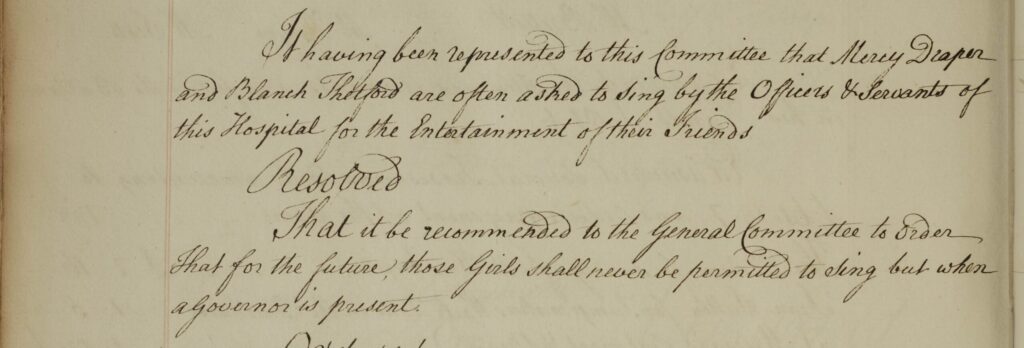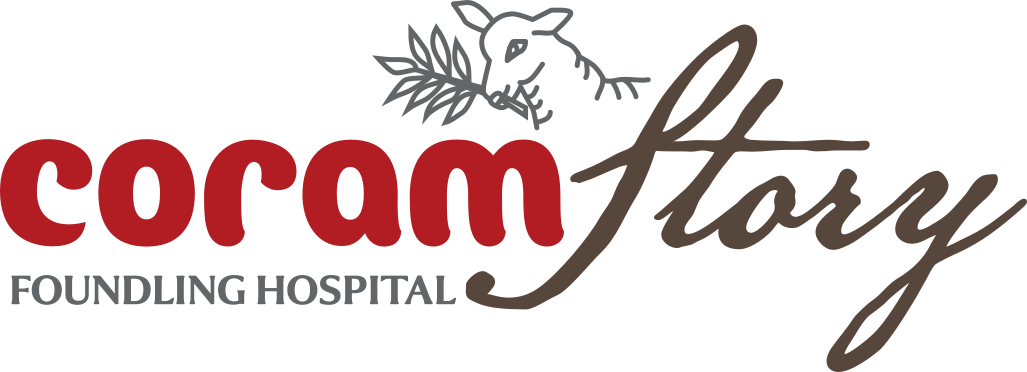Music was an incredibly valuable resource for blind Foundlings, not only as a means of employment but also as a way to gain respect within the Foundling Hospital. Blanche Thetford was one such Foundling who established a successful career both as a musician and a music teacher at the Hospital. Her story is perhaps one of the most remarkable accounts we can find within Coram’s Foundling Hospital Archive, both through the sheer number of records about her as well as the impact she made on the Hospital and its children.
Early life
Blanche was taken into the Foundling Hospital on 2 March 1758. We have no record of when she was born or who her mother was. However, a note attached to her billet sheet, with the name ‘Ann Dent’ written upon it, suggests that perhaps this is the name her mother gave her. Blanche was sent to be dry nursed to Jane Taylor in Yateley, Hampshire, where she stayed for five years before returning to the Foundling Hospital.
Shortly after she returned, she was inoculated for smallpox. The inoculation was successful; however, a year later, in May 1764, she was sent back to the infirmary for ‘inflammations of the Eyes’. This later led to Blanche becoming ‘incurably blind’, according to the Sub-Committee minutes. It is unclear whether this inflammation was a result of the inoculation, as smallpox often led to blindness, or whether this was a result of a different infection. Either way, this event became a huge turning point for Blanche. She was eventually listed in 1770 among other disabled Foundlings as being ‘unfit to be apprenticed’ due to her blindness. Nevertheless, this soon led to a new opportunity for Blanche.
Blanche’s musical education
On 25 July 1772, the Sub-Committee minutes record a visit from an organist named Mr Scott, which reads as follows:
‘Mr Scott, Organist Attended this Committee and having given an Account of his Board which he has Invented for teaching Blind persons Musick and writing the same such Board being wanted for Blanch Thetford a Blind Girl of this Hospital.’ – A/FH/A/03/005/010/156
This is the first mention in the Foundling Hospital records of Blanche’s musical education. The board provided some form of tactile instruction in order to teach blind people to read and write music themselves. Through receiving this board, Blanche was given access to a new understanding of music, which in turn led to her performing in the Hospital’s chapel at fundraising concerts, both singing and playing the harpsichord. It is clear that Blanche had a real talent for singing, so much so that in 1775 it was recorded in the minutes that Blanche and Mercy Draper would often be asked by officers and servants at the Hospital to sing for them and their guests (A/FH/A/03/005/011/276). This was soon flagged as an issue to the Governors, and it was decided that they would no longer sing for anyone unless a Governor was present, perhaps in an attempt to avoid the girls being exploited for their talents.

Sub-Committee Minutes, 18 February 1775 – A/FH/A/03/005/011/276
Later that year, Blanche was assigned another disabled Foundling, Sarah Bettison (No. 16387, admitted 10 January 1764), who was taught to read and write music for Blanche. Sarah had a major injury in her left hand due to a burn and was therefore, like Blanche, unlikely to be employed outside of the Hospital. She was taught by Mercy Draper, Blanche’s own mentor, to read and write music, and she continued to assist Blanche with her music until she was eventually apprenticed in 1779.
A harmonious career
When she was 21, Blanche was officially discharged from the Hospital but stayed on as an employed musician and music teacher. She was originally paid £6 a year, but in 1781 she approached the Governors to request a raise in her wages to cover the costs of the ‘necessary Apparel’ for her role. The Governors accepted this as they believed Blanche to be ‘very usefull [sic] in the Chapel’. As a result, her wages increased to £10 a year. This was hugely significant as many Foundlings who stayed on as staff at the Foundling Hospital, particularly disabled Foundlings, were rarely paid for their work. If they were paid, their salaries were often no higher than £3 a year (A/FH/A/03/005/019/207-208). Therefore, we can see that Blanche was highly respected by the Governors for her to receive such a high wage.

Sub-Committee Minutes, 12 May 1781 – A/FH/A/03/005/015/257
Blanche was also assigned her own parlour at the Hospital complete with her own harpsichord. The parlour, a small sitting room, was most likely the one Mercy had occupied before leaving to pursue her own musical career. Blanche’s dining arrangements were also gradually improved, starting at the Mistresses’ table in 1773 and moving up to the Stewards’ table ten years later. The Steward was a senior member of staff who often oversaw the investigations into mothers’ cases; therefore, this would have been a coveted dining position. In 1819, she is finally recorded as dining on the Officers’ table alongside secretary John Brownlow, again highlighting her place among the highest ranking staff.
From 1784, Blanche regularly performed with other former Foundling musicians, such as organist Tom Grenville and her mentor Mercy Draper, both in the Chapel for services and concerts and in the Matron’s parlour on Monday evenings (A/FH/A/03/005/018/053). The Treasurer gave the musicians tickets ‘to be distributed by the Performers to their Friends’, suggesting the Matron’s concerts were a formal and well-attended affair.
Blanche the tutor
Eventually, Blanche succeeded Mercy in teaching other Foundlings to sing and play music. In 1789, she was instructed to take on Jane Freer (No. 17928, admitted 3 July 1784). Jane, like Blanche, was blind and at age 5 was moved into Blanche’s parlour to live with her while learning music (A/FH/A/03/005/020/175). Jane seemed to do remarkably well under Blanche’s tutelage and was even gifted a guitar from the Sub-Committee, showing the breadth of her musical talents (A/FH/A/03/005/023/213).
Blanche also took some care in ensuring Jane was comfortable with her living arrangements as they changed during her time at the Hospital. This is best demonstrated by a note that Matron presented to the Sub-Committee in 1817. The note detailed a discussion between the Matron and Blanche where they agreed to the following:
‘That Jane should Breakfast dress and dine in the Invalid Ward , or breakfast with Miss Thetford, and dine at the Officer’s Table is she preferred it, to sleep take her Tea and be in the Ward … except at these three stated times, as much as she pleased’ – A/FH/A/03/005/030/213
Typically, the Foundlings’ routine was regimented and offered little freedom in their movements around the Hospital, particularly for mealtimes. Therefore, this decision put Jane in a uniquely privileged position by giving her the choice to eat where she pleased. This was, as the Matron admitted, in part due to Jane’s ‘obstinancy’ in the Invalid Ward, where foundlings with disabilities lived. Matron presented it as a way to keep the peace in the Ward, suggesting that Jane perhaps had arguments with other Foundlings and refused to comply with its rules due to her stubbornness. Despite this, it is important to note that these solutions were still dependent on Jane’s own preference, thus giving her some agency in the arrangements.
Blanche continued to teach Jane and other musician foundlings such as William Rowley (no. 17896, admitted 3 January 1784) until her death in 1833. The Committee agreed to honour her last request to be interred within the Chapel’s grounds, highlighting the importance of the site to both her career and her life. Blanche was clearly a well-respected figure in the Foundling Hospital who did a great deal to foster the musical community there by nurturing future talents.
Bibliography
Billet Books:
A/FH/A/09/001/087/121
General Registers:
A/FH/A/09/002/002/403
Nursery Books:
A/FH/A/10/003/005/177
Infirmary Reports:
A/FH/A/18/005/002/074
Sub-Committee Minutes:
A/FH/A/03/005/009/089
A/FH/A/03/005/010/156
A/FH/A/03/005/010/258
A/FH/A/03/005/011/276
A/FH/A/03/005/012/033
A/FH/A/03/005/012/127
A/FH/A/03/005/012/193
A/FH/A/03/005/015/186
A/FH/A/03/005/015/227
A/FH/A/03/005/015/257
A/FH/A/03/005/016/270
A/FH/A/03/005/018/053
A/FH/A/03/005/018/209
A/FH/A/03/005/019/207
A/FH/A/03/005/019/208
A/FH/A/03/005/020/175
A/FH/A/03/005/022/314
A/FH/A/03/005/023/224
A/FH/A/03/005/030/213
A/FH/A/03/005/030/214
A/FH/A/03/005/030/386
A/FH/A/03/005/034/147
Copyright © Coram. Coram licenses the text of this article under Creative Commons Attribution-NonCommercial 4.0 (CC BY-NC).

